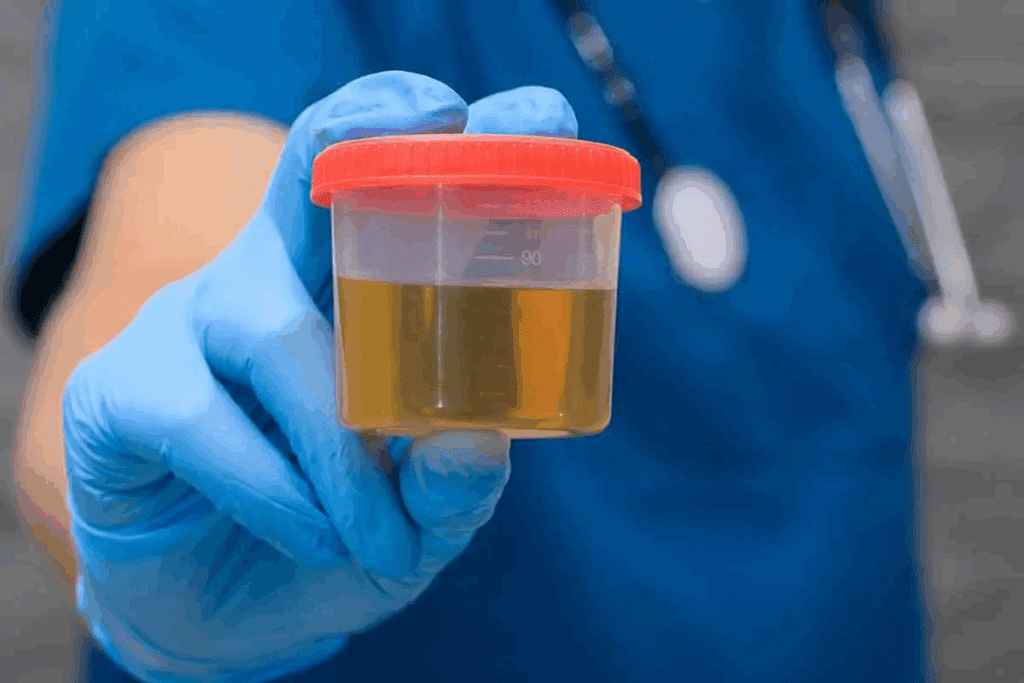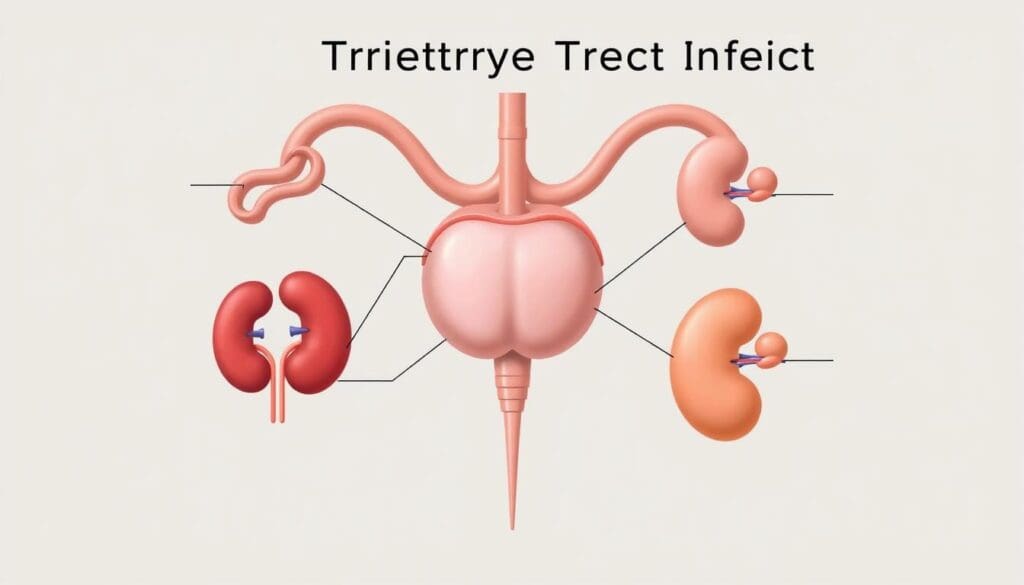Last Updated on October 31, 2025 by Bilal Hasdemir

Urinary Tract Infections (UTIs) are very common worldwide. In 2019, there were about 404.61 million cases. The question of whether a UTI can go away without treatment is complex.If a UTI left untreated, what are the risks? Learn why it is unlikely to clear up and the serious danger of pyelonephritis.
Some very mild cases might clear up on their own. But most UTIs need medical help. If not treated, they can cause serious problems.
It’s important to understand UTIs, even more so for those at higher risk. This includes pregnant women and older adults. They face a higher risk of serious complications.

Urinary Tract Infections (UTIs) are a big health issue. They affect different parts of the urinary system. UTIs happen when bacteria get into the urinary tract, causing infection and inflammation. We’ll look at the causes, symptoms, and types of UTIs to understand them better.
Most UTIs are caused by bacteria, with Escherichia coli (E. coli) being the top offender. Other bacteria like Klebsiella and Staphylococcus saprophyticus can also cause infections. These bacteria usually get into the urinary tract through the urethra. If not treated quickly, they can move up to the bladder and kidneys.
Key factors that increase the risk of UTIs include:
The symptoms of UTIs can vary. They depend on where and how severe the infection is. Common symptoms include:
Spotting these symptoms early is key. It helps in getting medical help quickly, which can prevent complications.
UTIs can affect different parts of the urinary tract, leading to various infections:
Knowing the type of UTI is important. It helps in choosing the right treatment and avoiding complications.

Urinary tract infections (UTIs) are a big problem worldwide. They affect many people and have serious health impacts. We will look at how common UTIs are and who they affect the most.
In 2019, there were about 404.61 million UTI cases globally. This shows how big of a health issue UTIs are. They are more common in some groups than others.
Let’s see who gets UTIs the most:
| Demographic Group | Estimated UTI Cases (2019) | Prevalence Rate |
| Women | 252.28 million | Higher due to anatomical factors |
| Men | 152.33 million | Lower, but increases with age |
| Pregnant Women | Not specified | Increased risk due to physiological changes |
| Older Adults | Not specified | Higher risk due to age-related factors |
Women get UTIs more often than men. This is because of their anatomy. Pregnant women and older adults also face a higher risk.
Knowing who gets UTIs helps in fighting them better. Healthcare can focus more on these groups. This way, they can help more people with UTIs.
Whether a UTI can clear up without antibiotics is a complex issue. It depends on the type and severity of the infection. While antibiotics are common for UTIs, some mild cases might heal on their own.
Research shows that some UTIs can clear up without antibiotics. For example, a study found that 25-50% of uncomplicated UTIs in women get better on their own within a week.
Key findings from research include:
Several factors can affect whether a UTI will clear up without antibiotics. These include:
It’s important to remember that while some UTIs may clear up on their own, untreated UTIs can lead to serious complications like kidney damage.
Bladder infections (cystitis) are more likely to clear up on their own than infections that reach the kidneys (pyelonephritis). Understanding the difference between these types is key to knowing if a UTI might heal naturally.
A study found that the chance of a UTI clearing up on its own is higher in women with uncomplicated cystitis than in those with complicated or upper UTIs.
“The decision to forgo antibiotics should be made with caution and ideally under medical supervision, as untreated UTIs can lead to serious complications.”
In conclusion, while some UTIs, like mild and uncomplicated cases, might clear up without antibiotics, it’s important to consider the risks and individual factors before making a decision.
The time an untreated urinary tract infection (UTI) lasts varies. It depends on the infection’s type and severity. Without treatment, UTIs can last from a few days to weeks or even months. This can lead to serious complications.
Usually, uncomplicated UTIs can clear up in a week or two. But, this isn’t always the case. Some UTIs can get worse or last longer if not treated.
| Type of UTI | Typical Duration Without Treatment | Potential Complications |
| Cystitis (Bladder Infection) | 3-7 days | Pyelonephritis (Kidney Infection) |
| Urethritis (Urethral Infection) | 3-7 days | Prostate Infection in Men |
| Pyelonephritis (Kidney Infection) | Several weeks or longer | Kidney Damage, Sepsis |
Several factors can affect how long a UTI lasts without treatment. These include:
It’s important to watch symptoms to see if a UTI is getting better or worse. Signs of improvement include:
On the other hand, signs that the infection is getting worse include:
Understanding these factors and closely watching symptoms can help decide the best action for a UTI.
Untreated UTIs can lead to serious problems in the urinary system. If not treated quickly, the bacteria can spread. This can cause more serious health issues.
The urinary tract has two parts: the lower (bladder and urethra) and upper (kidneys and ureters). UTIs usually start in the lower part. If not treated, they can move up to the kidneys, causing a more serious infection.
Some bacteria are more likely to spread. This is also true if your immune system is weak. Problems like urinary tract issues or catheters can help the infection move up.
Pyelonephritis is a serious kidney infection. Symptoms include flank pain, fever, and nausea. If not treated, it can damage the kidneys permanently.
Pyelonephritis is a serious stage of UTI. It needs quick medical attention. It can cause a lot of harm and, in bad cases, lead to sepsis.
In severe cases, an untreated UTI can turn into bacteremia. This is when bacteria get into the blood, leading to sepsis. Sepsis is a dangerous condition that can harm the body’s own tissues and organs.
Sepsis is a medical emergency. It needs immediate treatment. The risk of sepsis from an untreated UTI shows why you should see a doctor if symptoms get worse.
We stress the importance of acting fast to treat UTIs. This can prevent serious problems.
Urinary tract infections (UTIs) can be a big problem for some groups. This includes pregnant women, the elderly, and people with certain health issues. We’ll look at how these groups face higher risks.
Pregnancy changes a woman’s body in ways that can increase UTI risks. These changes can lead to kidney infections, which are serious for both mom and baby.
Key risks for pregnant women include:
Untreated UTIs in pregnant women can lead to serious problems. Getting medical help quickly is very important.
The elderly face unique challenges with UTIs. They often have more severe symptoms and are at higher risk of complications. This is because their immune system is weaker and they may have other health issues.
Common challenges in elderly patients include:
It’s important to catch and treat UTIs early in the elderly to manage their health.
While UTIs are more common in women, men are not safe from them. The risks vary between genders because of differences in anatomy and physiology.
Key differences include:
| Characteristics | Women | Men |
| UTI Frequency | More common due to shorter urethra | Less common, often related to underlying conditions |
| Risk Factors | Sexual activity, pregnancy | Prostate issues, urinary tract abnormalities |
| Complications | Kidney damage, recurrent infections | Prostate infection, possible sepsis |
Knowing these differences helps in creating better prevention and treatment plans.
Some mild UTIs might go away on their own. But, there are natural ways and self-care steps that can help. These can make symptoms better and help you get better faster. Adding these to your daily life might make you feel better and stop UTIs from coming back.
Drinking lots of water is a top natural remedy for UTIs. It helps flush out bad bacteria from your urinary tract. This can lower the chance of getting an infection. Try to drink 8-10 glasses of water every day to keep your urinary system healthy.
Some foods might also help. Cranberry products might stop bacteria from sticking to your bladder and urinary tract. But, remember to only have cranberry juice or supplements in small amounts because of their sugar and possible drug interactions.
There are OTC products that can ease UTI symptoms. Urinary pain relievers, like phenazopyridine, can lessen discomfort and pain when you pee. But, use these only as your doctor tells you to and for a short time. They might hide symptoms without fixing the infection.
Some people find relief with urinary tract health supplements. These might have D-mannose, uva ursi, or probiotics. While they might not work for everyone, they could help keep your urinary tract healthy and lower UTI risk.
Changing your lifestyle can also help with UTIs. Keeping clean, like wiping right and peeing after sex, can stop bacteria from getting into your urinary tract.
Other lifestyle changes that might help include:
By using these natural remedies, self-care steps, and lifestyle changes, you can manage mild UTIs better. This might also lower your chance of getting UTIs again in the future.
Knowing when to get medical help for UTIs is key to avoiding serious problems. Some UTIs might get better on their own. But, there are times when you need to see a doctor to stop the infection from getting worse.
Some symptoms mean you need to see a doctor right away. These include:
If you notice any of these signs, don’t wait. Getting help quickly is important. Waiting too long can cause serious problems like kidney damage or sepsis.
Doctors usually give antibiotics for UTIs. The kind and how long you take them depends on the infection’s severity and your health. For simple UTIs, a short antibiotic treatment usually works well.
At times, doctors might suggest other treatments to help with symptoms. These can include:
At your doctor’s office for a UTI, you’ll get a full check-up and tests. This might include:
Your doctor will then suggest a treatment plan based on the diagnosis. It’s important to follow the treatment plan and finish all antibiotics. This ensures the infection is fully treated.
By knowing when to get medical help for UTIs and what to expect at the doctor’s, you can take care of your health. This helps prevent serious problems.
Keeping your urinary system healthy is key to avoiding UTIs. By using the right prevention methods, you can lower your chances of getting UTIs again. This makes life better and more enjoyable.
Keeping clean is a big part of stopping UTIs. Wiping from front to back after using the bathroom is a simple trick. It keeps bacteria out of your urethra. Also, gently clean your genital area.
Stay away from harsh soaps and douches. They can make your urethra sore and raise your infection risk. Wear cotton underwear instead of synthetic ones. Cotton lets air in and keeps moisture away, which bacteria don’t like.
What you eat and drink matters a lot in preventing UTIs. Drink lots of water to wash out bacteria from your urinary system. Aim for 8-10 glasses a day.
Cranberry juice might help prevent UTIs, but it’s not always effective. Some research shows it can stop bacteria from sticking to your bladder walls.
If you keep getting UTIs, you might need more help to stop them. This could include low-dose antibiotic prophylaxis or vaginal estrogen therapy for women after menopause.
It’s also good to void after intercourse to get rid of bacteria. Taking probiotics can help keep your urinary tract healthy too.
By following good hygiene, eating right, and using other prevention methods, you can lower your UTI risk. Talking to a healthcare provider about the best prevention plan is a smart move.
Urinary tract infections (UTIs) need a careful treatment plan. Some mild UTIs might get better on their own. But, it’s important to mix self-care with medical help to avoid problems.
Understanding UTIs is key. Knowing their causes, symptoms, and types helps a lot. Taking steps to prevent UTIs can lower the risk a lot. If symptoms don’t go away or get worse, seeing a doctor is a must.
Combining self-care with medical treatment is essential for good urinary health. Knowing the signs and acting early can help avoid serious issues. A good UTI treatment plan includes both self-care and doctor visits.
Some UTIs might clear up without antibiotics. But, it’s not always the case. Not treating a UTI can cause serious problems. We talk about what affects natural healing and the dangers of ignoring symptoms.
The time a UTI lasts without treatment varies. It depends on the type of UTI and your health. Symptoms can last days to weeks. In some cases, the infection can get worse.
Not treating a UTI can lead to serious infections. This includes kidney infections and systemic infections. These are big risks for pregnant women and the elderly.
Some bladder infections might clear up on their own. But, it’s important to watch your symptoms. If they get worse or don’t go away, see a doctor. Your health and how well you stay hydrated can affect recovery.
Some UTIs might clear up without antibiotics. But, relying only on self-care and natural remedies is not enough. We look at how staying hydrated, your diet, and lifestyle can help with mild UTIs.
The length of a UTI varies. It depends on treatment and how well it works. Untreated UTIs can last weeks. They might even become chronic or keep coming back.
See a doctor if your symptoms are severe. This includes a lot of pain, fever, or vomiting. If symptoms don’t get better or get worse, seek help. We explain when to go to the doctor and what to expect.
Yes, you can prevent UTIs. Good hygiene, diet, and preventive steps for recurring UTIs can help. We go into detail on these methods to lower your risk of UTIs.
Some natural remedies and self-care can help with mild UTIs. Staying hydrated and using over-the-counter products can ease symptoms. But, always get medical treatment when needed.
Pregnant women face a higher risk of UTIs and complications. Untreated UTIs in pregnancy can cause serious infections. It’s very important for pregnant women to get medical help if they think they have a UTI.
Subscribe to our e-newsletter to stay informed about the latest innovations in the world of health and exclusive offers!
WhatsApp us